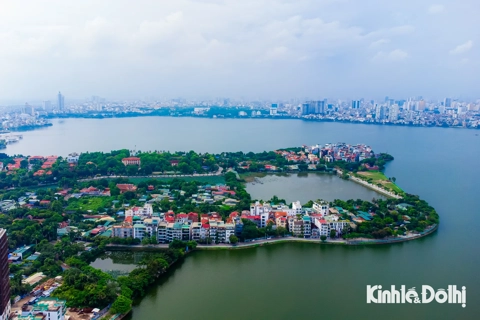Western West Lake area poised to become Hanoi’s next-generation office center
Driven by expanding metro lines, ring roads and a renewed West Lake master plan, Tay Ho Tay or the western area of the West Lake is emerging as a strategic office hub under Hanoi’s shift toward transit-oriented urban development.
23 Feb, 03:10 PMInfrastructure plans fuel surge in Hanoi suburban land auctions
Surging land auctions in Hanoi’s outlying communes, marked by sharply higher winning bids, point to returning capital and renewed confidence, while also stirring debate over speculation risks and whether prices truly reflect long-term demand and market fundamentals.
10 Feb, 03:20 PMTet renovation rush strains Hanoi crews, lifts finishing material costs prices
Hanoi’s home renovation market has entered its busiest stretch of the year, as year-end demand tightens contractor availability and raises the cost of finishing materials.
01 Feb, 04:31 PMVietnam construction materials rebound as prices rise and public investment accelerates
Rising steel and cement prices, stronger public investment spending and improving consumption across key material segments point to a broad recovery in Vietnam’s construction materials sector as 2026 begins.
01 Feb, 03:00 PMHanoi sets 40 sq.m housing space goal to lift urban living standards
Raising average housing space marks a people-centered shift in urban policy as the capital works to improve living standards, expand social housing and ensure that rapid economic growth goes hand in hand with safer and more livable neighborhoods.
30 Jan, 04:45 PMPrime Minister urges measures to boost supplies and control house prices
Vietnam’s government is stepping up efforts to rebalance the real estate market as Prime Minister Pham Minh Chinh urges faster policy action to expand housing supply, address affordability pressures and ensure the sector supports both economic stability and social welfare.
27 Jan, 08:55 PMHo Chi Minh City forms first professional association for apartment management
Amid rapid urban growth, Ho Chi Minh City has established a professional body for apartment management, becoming the first locality in Vietnam to do so.
24 Jan, 08:49 PMReal estate credit surge prompts tighter oversight to safeguard Vietnam’s financial stability
Vietnam’s real estate sector has absorbed a sharp rise in credit, supporting market recovery while raising concerns over capital concentration, speculative risks and the need for tighter policy coordination.
21 Jan, 09:16 PM









